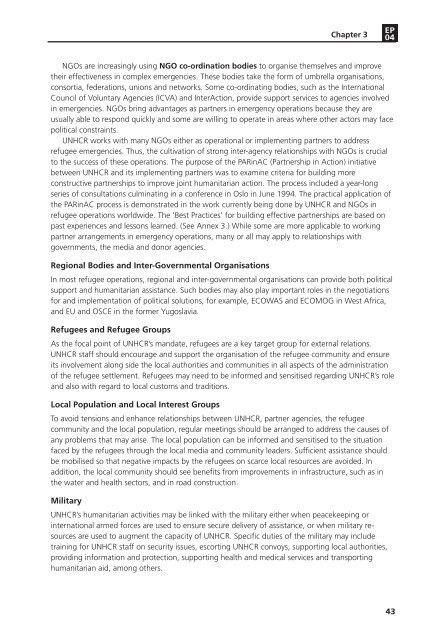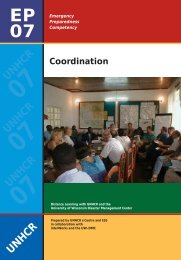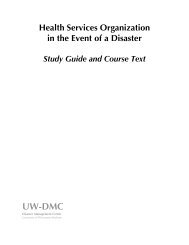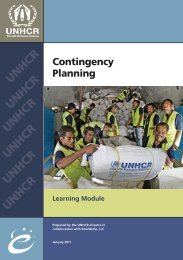Managing External Relations - Disaster Management Center ...
Managing External Relations - Disaster Management Center ...
Managing External Relations - Disaster Management Center ...
Create successful ePaper yourself
Turn your PDF publications into a flip-book with our unique Google optimized e-Paper software.
Chapter 3<br />
NGOs are increasingly using NGO co-ordination bodies to organise themselves and improve<br />
their effectiveness in complex emergencies. These bodies take the form of umbrella organisations,<br />
consortia, federations, unions and networks. Some co-ordinating bodies, such as the International<br />
Council of Voluntary Agencies (ICVA) and InterAction, provide support services to agencies involved<br />
in emergencies. NGOs bring advantages as partners in emergency operations because they are<br />
usually able to respond quickly and some are willing to operate in areas where other actors may face<br />
political constraints.<br />
UNHCR works with many NGOs either as operational or implementing partners to address<br />
refugee emergencies. Thus, the cultivation of strong inter-agency relationships with NGOs is crucial<br />
to the success of these operations. The purpose of the PARinAC (Partnership in Action) initiative<br />
between UNHCR and its implementing partners was to examine criteria for building more<br />
constructive partnerships to improve joint humanitarian action. The process included a year-long<br />
series of consultations culminating in a conference in Oslo in June 1994. The practical application of<br />
the PARinAC process is demonstrated in the work currently being done by UNHCR and NGOs in<br />
refugee operations worldwide. The ‘Best Practices’ for building effective partnerships are based on<br />
past experiences and lessons learned. (See Annex 3.) While some are more applicable to working<br />
partner arrangements in emergency operations, many or all may apply to relationships with<br />
governments, the media and donor agencies.<br />
Regional Bodies and Inter-Governmental Organisations<br />
In most refugee operations, regional and inter-governmental organisations can provide both political<br />
support and humanitarian assistance. Such bodies may also play important roles in the negotiations<br />
for and implementation of political solutions, for example, ECOWAS and ECOMOG in West Africa,<br />
and EU and OSCE in the former Yugoslavia.<br />
Refugees and Refugee Groups<br />
As the focal point of UNHCR’s mandate, refugees are a key target group for external relations.<br />
UNHCR staff should encourage and support the organisation of the refugee community and ensure<br />
its involvement along side the local authorities and communities in all aspects of the administration<br />
of the refugee settlement. Refugees may need to be informed and sensitised regarding UNHCR’s role<br />
and also with regard to local customs and traditions.<br />
Local Population and Local Interest Groups<br />
To avoid tensions and enhance relationships between UNHCR, partner agencies, the refugee<br />
community and the local population, regular meetings should be arranged to address the causes of<br />
any problems that may arise. The local population can be informed and sensitised to the situation<br />
faced by the refugees through the local media and community leaders. Sufficient assistance should<br />
be mobilised so that negative impacts by the refugees on scarce local resources are avoided. In<br />
addition, the local community should see benefits from improvements in infrastructure, such as in<br />
the water and health sectors, and in road construction.<br />
Military<br />
UNHCR’s humanitarian activities may be linked with the military either when peacekeeping or<br />
international armed forces are used to ensure secure delivery of assistance, or when military resources<br />
are used to augment the capacity of UNHCR. Specific duties of the military may include<br />
training for UNHCR staff on security issues, escorting UNHCR convoys, supporting local authorities,<br />
providing information and protection, supporting health and medical services and transporting<br />
humanitarian aid, among others.<br />
EP<br />
04<br />
43








